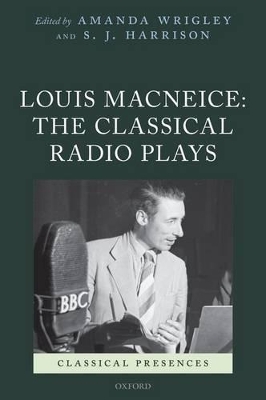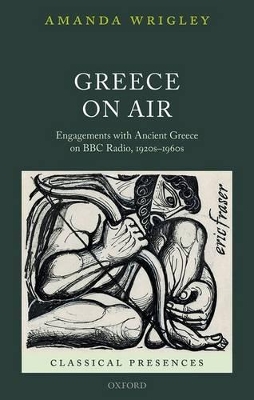Classical Presences
2 total works
Louis MacNeice: The Classical Radio Plays
by Amanda Wrigley and S.J. Harrison
Published 27 June 2013
This volume presents eleven radio scripts written and produced by the poet and writer Louis MacNeice (1907-1963) over the span of his twenty-year career at the BBC, during which he wrote and produced well over a hundred radio scripts on an impressively wide variety of subjects. This volume's selection of scripts, all but one of which is published for the first time, illustrates the various ways that MacNeice re-worked one particular and recurrent source of material
for radio broadcast - ancient Greek and Roman history and literature.
The volume thus seeks to explore MacNeice's literary relationship with classical antiquity, including engagements with authors such as Homer, Thucydides, Aristophanes, Xenophon, Petronius, Apuleius, and Horace, in a variety of types of programmes from wartime propaganda work, which used ancient Greek history to comment on the international situation, to lighter entertainment programmes drawing on the Roman novel. MacNeice's educational background in classics, combined with his skill as a writer
and his ability in exploring radio's potential for creative work, resulted in programmes which brought the ancient world imaginatively alive for a massive, popular audience at home and abroad.
Each script is prefaced by an individual introduction, written by the editors and guest contributor Gonda Van Steen, detailing the political and broadcasting contexts, the relationship of the script with classical antiquity, notes on cast and credits, and the reception of each script's radio performance amongst contemporary listeners. The volume opens with a general introduction which seeks to contextualise the scripts in MacNeice's wider life and work for radio, and it includes an appendix of
extant MacNeicean scripts and recordings.
for radio broadcast - ancient Greek and Roman history and literature.
The volume thus seeks to explore MacNeice's literary relationship with classical antiquity, including engagements with authors such as Homer, Thucydides, Aristophanes, Xenophon, Petronius, Apuleius, and Horace, in a variety of types of programmes from wartime propaganda work, which used ancient Greek history to comment on the international situation, to lighter entertainment programmes drawing on the Roman novel. MacNeice's educational background in classics, combined with his skill as a writer
and his ability in exploring radio's potential for creative work, resulted in programmes which brought the ancient world imaginatively alive for a massive, popular audience at home and abroad.
Each script is prefaced by an individual introduction, written by the editors and guest contributor Gonda Van Steen, detailing the political and broadcasting contexts, the relationship of the script with classical antiquity, notes on cast and credits, and the reception of each script's radio performance amongst contemporary listeners. The volume opens with a general introduction which seeks to contextualise the scripts in MacNeice's wider life and work for radio, and it includes an appendix of
extant MacNeicean scripts and recordings.
Greece on Air offers the first substantial discussion of the fascinating history of creative and public engagements with ancient Greek literature, history, and thought via the BBC Radio, from the birth of domestic broadcasting in the 1920s up to the 1960s.
The astonishing range of programmes broadcast in this period includes some of the most interesting, creative, and political engagements with ideas from and about ancient Greece in twentieth-century Britain. From talks to schools and adult education groups, creative re-imaginings of ancient historical texts written and broadcast as Second World War propaganda, and scores of performances of Greek tragedy, comedy, and their modern adaptations, Wrigley draws on the vast amount of evidence that
exists in the written archives (both for production processes and also listeners' responses) to develop a full understanding of the role of the radio medium in public engagements with ancient Greece in twentieth-century Britain.
The astonishing range of programmes broadcast in this period includes some of the most interesting, creative, and political engagements with ideas from and about ancient Greece in twentieth-century Britain. From talks to schools and adult education groups, creative re-imaginings of ancient historical texts written and broadcast as Second World War propaganda, and scores of performances of Greek tragedy, comedy, and their modern adaptations, Wrigley draws on the vast amount of evidence that
exists in the written archives (both for production processes and also listeners' responses) to develop a full understanding of the role of the radio medium in public engagements with ancient Greece in twentieth-century Britain.

